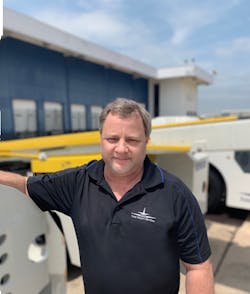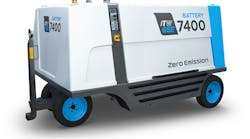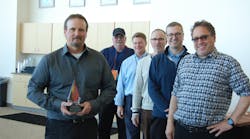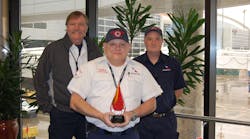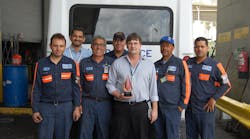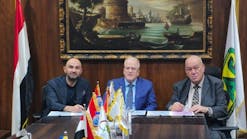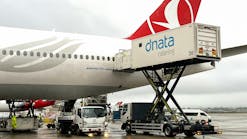Dana Perry: 2020 Team Leader of the Year
When Dana Perry enrolled in art school, a future in the aviation industry wasn’t the most likely career path. But the part-time job he took at Seattle-Tacoma International Airport to pay for school opened the door.
Since then, his capacity to digest black-and-white data and metrics coupled with his ability “to see in color” has allowed him to advance his career, where he now leads nearly 1,700 people across eight stations nationwide for Total Airport Services (TAS).
In the last year, Perry has led TAS’ most recent start-up station in Houston – the first for TAS at George Bush Intercontinental Airport. His leadership allowed a customer to bring a station from one of the worst performing to achieving No. 1 station performance within one quarter. What’s more, his mentorship resulted in a single station turnover of 4 percent.
Silvio Tano, CEO at TAS, says Perry’s knowledge and approachability has made him the go-to person at TAS.
“Dana has a down to earth ‘keep it simple’ management outlook and is a good, ethical person – as all true leaders are required to be,” Tano says, noting Perry is respected at all levels of the organization. “He also has an uncanny ability to build trust across many disciplines.”
With a supreme talent to communicate with and set an example for his team, Perry is distinctively qualified to be Ground Support Worldwide’s 2020 Team Leader of the Year.
Part-Time Job to Career
Perry has always been near aviation, including his childhood home directly below the flight path of Sea-Tac. While he watched the planes above and felt the windows of his bedroom rattle, he believes this experience unknowingly guided his path toward aviation.
After high school, he took a part time job washing and detailing planes for Jack Reed Aircraft Sales at a small regional airport in Auburn.
“That was really the first time up-and-close touching airplanes,” Perry says.
When he was back in school, he took a part time job at Sea-Tac, working for Aviation West – a small, one-station operation.
“Basically, it empowered me to do everything and challenge me, giving me roles that I wasn’t necessarily comfortable with,” Perry says, adding he spent 16 years at Aviation West.
He began as an agent in the warehouse, building up for CargoLux and Air France and did the handling for those flights. He advanced to be ramp lead, then supervisor and later assistant manager.
“Then I got full control of the office and warehouse,” Perry says. “I was in sales and service. Then assistant station manager and eventually station manager.
“That company was sold to a little bit larger company – Aviation Ground Services in ’98,” he adds. “Then in 2000 is when I ended up taking over the station leadership.”
Perry says the rest is history.
“That part-time job I took at Sea-Tac was just to pay the bills while I was in art school,” he recalls. “I was going to be an artist and here I am today. I still like to draw, but my time is focused at the airport.”
Total Airport Services
Perry was promoted to his current role of senior vice president of operations after three years at TAS.
In his role, he is responsible for the company’s complete operational portfolio, which includes passenger handling, cargo warehouse and ramp operations, GSE fueling and maintenance, in addition to other support services at eight stations, representing 1,700 employees across the US.
“When I came on to TAS mid-2016, I came from Swissport – a very large company,” explains Perry, who joined TAS as director of operations support, following stints as general manager at Swissport and a regional director at Servisair, having managed a portfolio of $50 million and 1,500 employees across nine stations. “What excited me about TAS is it kind of got me back to my roots – a smaller, more agile, operation, closer to the decision-makers. But, TAS is also supported by CCR, one of the largest infrastructure companies in the world, that also does the design, finance, build and management of airports. It’s the best of both worlds.
“I really came in just supporting procurement and maintenance,” Perry continues. “We’ve had significant growth over the last three years and I’ve been privileged to support that growth in my three years here.”
When Perry moved into a more aggressive role, tasked with overseeing all passenger services and cargo warehousing, he became responsible for all locations, all financial performance, all operations performance and all safety.
“Dana has successfully led very complicated startups that required significant additions of staff and equipment with minimal lead times,” says Tano, noting a massive and simultaneous multi-account start-up at LAX in 2018.
Perry directly manages five positions. Three are regional GMs that, between them, oversee eight stations. The company’s financial analyst and director of GSE maintenance also report to Perry.
TAS’ stations are split into regions. All station managers report to Perry’s operations team; and they are responsible for station operations as well as regional profits and losses (P&Ls).
“So, I do have good coverage for oversight,” Perry says. “I was definitely getting ran a little thin due to our quick growth, touching everybody as often as I had to, to run the organization. The organizational structure has actually grown since I’ve moved into this position, which was needed. We’re still building for future growth.”
Communication and Accessibility
With eight stations across the country, employing approximately 1,700 people, Perry’s leadership is critical to the overall success of TAS.
The company’s CEO admires Perry’s ability to communicate with his team, provide accessibility and display a willingness to teach.
“He also creates a collaborative environment with his reports and empowers them to lead and make decisions,” Tano says. “Additionally, he delegates with full understanding of what specific efforts are required for successful outcomes. And, like all excellent leaders, he knows when to step into the fray when his subordinates need him to.”
Perry says it is all about the people. He believes developing relationships with staff better enables leaders to offer support and equip team members with the appropriate skills.
“To me, the first piece of success – or failure – is either communication or a lack of communication,” Perry says. “I don’t have a lot of meetings, but I do have a lot of conversations. I talk to all my direct reports daily.”
He says his team will schedule formal meetings if that is what’s required. But typically, his team doesn’t wait for those moments. Instead, they pick up the phone and talk once or twice a day.
“I get tired of typing emails all day. I’d rather pick up the phone and maybe back it up with an email if it needs to be documented,” Perry says. “That’s my approach to how I communicate with my team.”
To keep lines of communication open, Perry also emphasizes input from the field. He regularly visits stations in person to gather first-hand information and make himself accessible to the team.
“I’m definitely approachable to anything that’s needed,” Perry says.
According to Perry, efficient operations are a product of three fundamentals – planning, execution and accountability. While the nature of this business can often be reactionary, if those three elements are established, Perry says his team can handle anything.
“Unfortunately, the nature of this business is that there’s still a lot of reaction to things,” he says. “But with those three key things in place, we’re definitely more prepared for anything that can be thrown at us.”
With those fundamentals in place, Perry can tailor his leadership style to get the most out of specific employees’ strengths and mitigate weaknesses.
“I expect managers to run their business, but I’m always there to support them. They can always escalate something up to me, and I’ll put that on my shoulders and work with them on any challenges,” Perry says. “I always ask them to come up with some ideas, and then we’ll work together on those things.”
He has discovered that keeping his team involved in the decision-making process has been valuable.
“I learned that early on because I’m not someone who keeps information in and I don’t want to be the controller,” Perry says. “I’m not the best at everything. I like to have people that can do things a little better than me as well.”
“I like when it’s feasible to have as much input from them. I like them to be vested in decisions,” Perry says. “They know they can speak up if they have a better idea. I’m always open to it.”
He says leadership trickles down. He likes to see the things he does for his direct reports be passed along to their reports.
“Even starting from an agent, to a lead, to a supervisor, hopefully I wouldn’t have to tell them how to do it. All they would have to do is watch what I do and learn from what I do, and then pick those things up,” Perry says. “My example is important.”
Perry is also willing to help his team members outside the parameters of work, if it’s needed.
“That’s something that kind of comes with time,” Perry says. “A lot of managers like to keep it pretty stiff on how they interact with their employees.
“I’ve just found that it’s easier to not only be their boss, but to be their friend to a certain extent.”
Perry experienced similar friendships from his mentors early in his career.
Jack Michalek shared many of his personal experiences with Perry, from working his way through Continental to opening Aviation West. Because it was a small operations and Perry spent 14 years working side-by-side, their relationship grew. Perry benefited from that and tries to pay it forward with his current colleagues.
“I do like to know my reports a little outside of work, too. What they do and what their interests are and support them at work or maybe out of work to, if need be,” he explains.
Perry continued to learn from others after Aviation West was purchased. He says Joe McConnell was instrumental in teaching various aspects of overseeing a station.
“He kind of brought me up that next step,” Perry says of McConnell. “He moved me down to Phoenix where he was actually based and I spent four years with him. It was financing and refining some our planning tools.”
Perry adds that McConnell really hammered home the importance of good planning and helped Perry shape the way he formulates a plan.
“I always say I see things in color. But I do like numbers, so black-and-white is good. But numbers don’t always tell the whole story,” Perry notes.
Guidance for the Next Leaders
The aviation industry is never boring to Perry. There are new challenges every day, and those challenges require strong leadership.
Perry is currently leading his team through the COVID-19 pandemic and it is unknown what the next day holds. So, he places an importance on forecasting, leadership skills and staff development.
“If I can equip my staff with those tools, I know they can face any challenge,” Perry says.
“The most challenging thing is keeping all the managers engaged, keeping them positive, making sure we’re sharing the right information with employees and making sure everyone is kept safe.”
No matter what external factors are in play, Perry focuses on TAS’ three daily missions – ensuring the safety and wellbeing of its employees; ensuring quality service to its customers; and ensuring a financial responsibility to its shareholders.
“No matter the situation, we need to be equipped and agile enough to successfully achieve those goals,” Perry says.
This is why Perry enjoys the position he is in at TAS, and being part of the strategic thinkers.
“I sit two doors down from the CEO,” Perry says. “It’s exciting being able to help steer and direct this company. With the amount of growth we’ve had in three years, if we continue that, it’s an amazing place.”
Beyond the operation components, adds Tano, it is important that the person in this position can mentor the next generation of leaders. He points to Perry’s multi-faceted skillsets that allow him to lead his team across several disciplines, including customer service, contracts, labor efficiencies, safety and financial reporting.
“Dana’s mark on the organization is both present and future,” Tano concludes.
